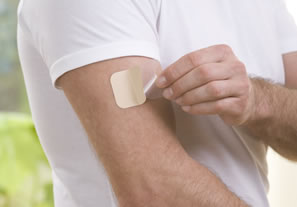One of the difficulties in curative medicine is compliance. There are various aspects: patients dislike the feeling of dependency on medications. In some cases there is a dislike for swallowing that pill, and if medications have to be taken several times per day, it can present even more of a challenge. People are busy with their daily routines, they may forget the one or the other dose, and it may very well compromise the effectiveness of a medication.
Various medications can now be administered through a transdermal patch. For sufferers of Parkinson’s disease a new transdermal treatment with the dopamine agonist rotigotine (brand name Neupro®) has been tested. It can become the first line of defense and ease the symptoms. The transdermal patch was generally safe, and as it was well tolerated, patients did not discontinue the treatment. The treatment with rotigotine can help postpone the commonly used medication levodopa, which tends to lose effectiveness over the years.
Another study with the rogitotine patch showed effectiveness for individuals suffering from restless leg syndrome. This disorder makes sleep difficult, and as a result the patient turns sleepy during wakeful hours. Dr. Karin Stiasny-Kolster, a neurologist at Phillips University in Marburg, Germany reported on favorable results with 340 patients suffering of restless leg syndrome.
In a controlled study, those patients who were wearing the rotigotine patch were showing improvement. Again, the transdermal system was well tolerated and safe and there was no problem with fluctuating dopamine levels. Placebo-treated patients did not respond. The product has been released in European countries and the FDA is investigating for release in the US soon.
More information about restless leg syndrome: http://nethealthbook.com/neurology-neurological-disease/restless-leg-syndrome/
Reference: The Medical Post, November 3, 2006, page 57-58
Comment: The FDA approved the patch under the name “Neupro-P”. Here is a meta analysis. It shows that the drug improved symptoms of Parkinson’s disease. but it also was associated with more side effects.
Last edited November 2, 2014






